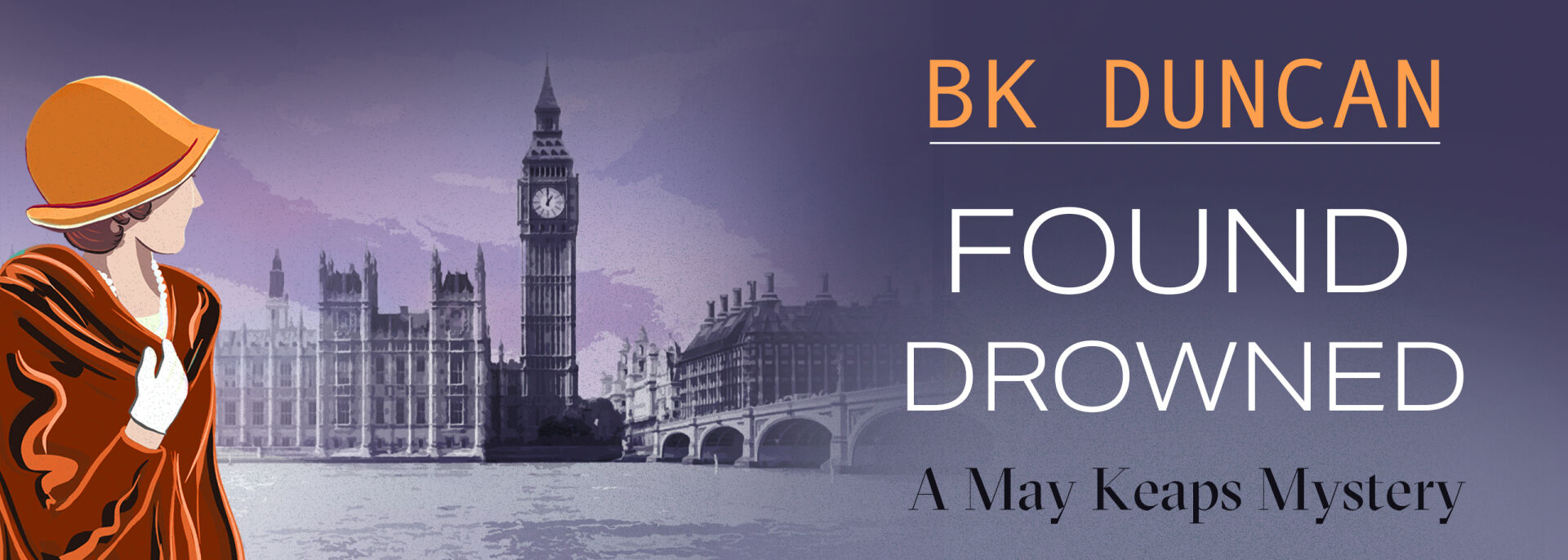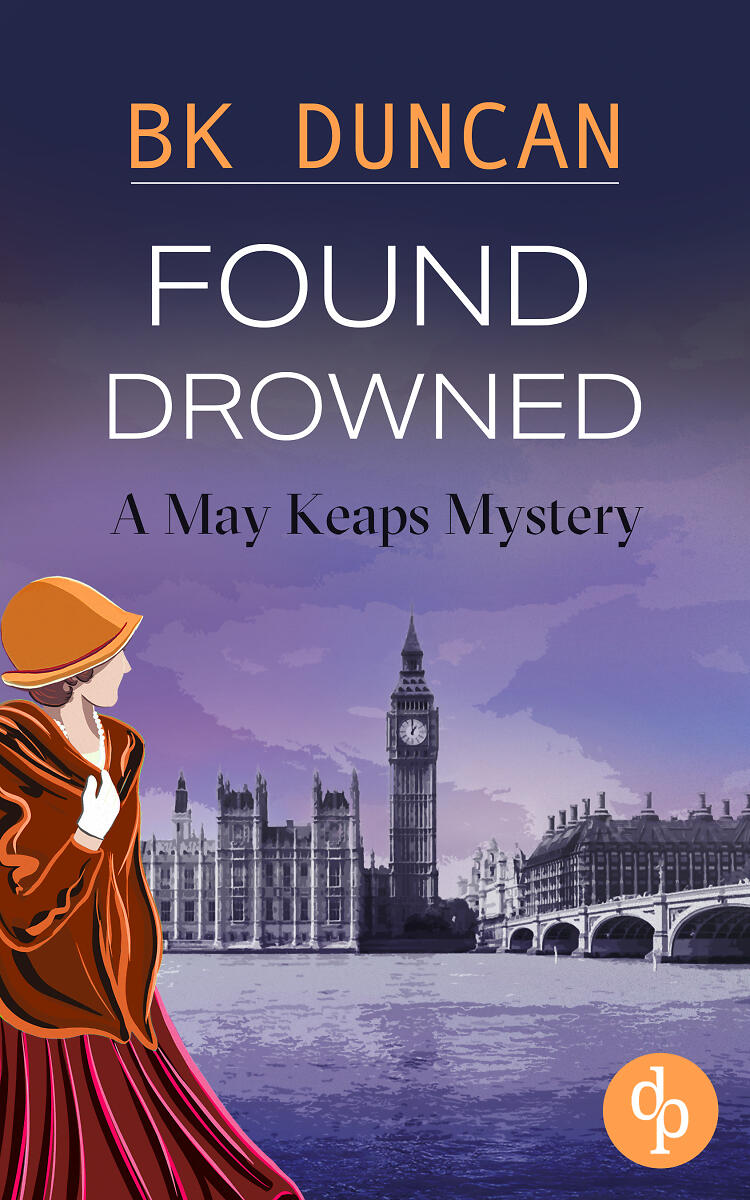CHAPTER ONE
Tuesday June 8th 1920
May tugged up her coat collar. The fog that had accompanied them on their journey had given way to a river mist that danced eerie shapes over the concrete quayside. She could hear the shouts of bargees and lightermen feeling their way downriver towards the docks. Beside her, PC Collier was stamping his boots to ward off the early morning chill. A smudgy light was cutting towards them. They walked to where a narrow slipway slid into the water. The sound of oars being shipped and then a voice:
‘Make lively there and give us a hand.’
PC Collier grabbed the prow of the rowboat as it loomed out of the cotton-wool white, while May caught the rope and tied it in a clove hitch to the mooring ring. She stood back and waited for the wet bobs to heave their cargo out of the boat, then followed the procession to the doors of the Thames River Police mortuary. In the thin yellow light of the lamp she could see five posters with FOUND DROWNED emblazoned in thick red letters. As Poplar Coroner’s Officer it was her job to try to prevent another unclaimed soul from being added to the list.
The interior smelled of wet canvas, sodden clothes, and decaying river debris; it reminded her of the field hospital in Etaples. The river policemen, their biceps turned to iron by rowing, flung the body onto a waiting trestle.
‘Bit of a sight, I’m sorry to say. Don’t know what they’re thinking having chits of girls to do the looking.’
The nickel anchor badge on the older policeman’s yachting cap winked slyly as he leant forward to pull back the tarpaulin. She heard PC Collier’s shuddering intake of breath – he should be the one they’d be prepared to catch in a dead faint. It was a boy, his face a mashed pulp the hue and texture of clotted cream, beneath hair so matted with filth it could’ve been any colour from mousy brown to jet black. The river had done its sinister best to turn him into one of its own: a creature swirled up from the dark depths, leached of everything resembling recognisable life.
‘Reckon he was messing in the river and misjudged the tide – it can come up fearsome this time of year. Probably one of those thought it’d be a doddle to swim out to a moored barge for a touch of pirating. Terrible trouble we has with them.’
‘When did you pick him up?’ May pulled her notebook from her satchel.
‘Three o’clock. We’d just passed the down-along boat so either they’d missed him or he weren’t there much before. Stopped off at Blackwall to let them know we’d gone fishing and hooked a floater.’
It wouldn’t be fair to tear him off for being flippant: they all had to find their own ways of dealing with the shock of gruesome discoveries. He would most likely go up to his children the moment he got home and wake them with a hug.
‘If you remember any other details of the circumstances, could you send your statements directly through to the coroner’s office? I don’t want things held up between police stations.’
‘Still won’t be for a while because we’re going off duty now until next week.’
‘Then I’d be grateful if you could make it the first thing you do when you get back. You’ll receive notification should you be required for the inquest. I’ll arrange for the undertaker to transfer him to our mortuary so if you could let whoever will be taking over this end know?’
PC Collier had saved her a lot of time and trouble by banging on her door as soon as the news had reached Poplar Police Station; if he’d waited, this crew would’ve clocked off and she’d have had a frustrating delay before being able to gather their testimony in person – official incident logs were one thing, looking into the eyes of a witness as they told their story, quite another. The young constable by her side was staring vacantly at the far wall, so she gently tugged at the wing of his cape before leading him back out into the cruel indifference of a new day.
CHAPTER TWO
It was eight-thirty when May put in a telephone call from her office to Braxton Clarke’s Westminster flat. His voice, when he’d answered, was sleepy and she felt a prick of envy for a world where a lie-in wasn’t a Sunday luxury. After she’d explained what had happened he’d told her to instruct Dr Swan to perform a post-mortem, pencil some dates in the courtroom diary, and ask the clerk to get a jury on the starting blocks. A kindly question or two about her well-being, a confirmation that he would be in as usual on Friday, and then she replaced the receiver in the cradle.
It must’ve been his half-awake sensibilities that’d led him to jumping the gun. By law a verdict couldn’t be reached on an unnamed body – the purpose of an inquest being to establish who the deceased was, before determining how they died – and Braxton Clarke could have no idea how difficult it would be for anyone to identify the boy until he’d seen for himself. But it was her responsibility to find someone who could.
Across the desk, PC Collier had taken off his helmet and was sipping the restorative cup of tea she’d made. He was looking less like a statue now he had some colour in his cheeks. She wondered if today would be his first taste of regret that he’d been assigned as a part-time member of the coroner’s team; the endless round of point-duty and pounding the beat he’d been so keen to escape must seem like heaven after what he’d been subjected to at the riverside. It was ridiculous to want to mother him (at twenty-two she was only a couple of years older) but there was something about his vulnerability that touched her. She suspected it was because she coveted it: France in the Great War had robbed everyone who’d been there of their innocence. She squashed the sentiment back down.
‘We’d better get started. Can you check your police records for the details of any young boys reported missing? Probably best to limit it to the last month or so.’
‘Begging your pardon, Miss Keaps, I know it’s procedure, and I’ll do it of course, but we hardly get any come through the official channels. There’s many parents sooner cut off their arms than get the authorities involved; and that’s not excepting the fact there’s some as might be welcoming one nipper less to feed and won’t be going out of their way to having them returned any time soon.’ He gulped. ‘Not that there’s any chance of that occurring in this case.’
May watched him finger the badge on his helmet. The action seemed to bring back his awareness of what it stood for.
‘We have made it our business to keep tabs on any we’ve had suspicions did away with a child too many so I’ll ask the sergeant for those he reckons could’ve tried to pull the wool over our eyes a second time.’
He stood up, placed his helmet back on his head and flicked the chinstrap into place.
‘I’m only hoping what we’re looking at here is an accident because there ain’t a jury in the land will remember that drink and desperation can turn even the best of us into monsters. And, if that was the case here, then I can’t say I won’t be joining them in calling for a hanging.’
***
It was mid-afternoon when Dr Swan came in to see her. He was a local general practitioner, and the previous coroner’s preferred medical man when it came to conducting post-mortems. On being appointed to replace Colonel Tindal, Braxton Clarke had been happy to maintain the arrangement as the doctor was efficient, reliable, understood that a jury didn’t like being intimidated by details they didn’t understand, and prepared to share his opinions when he thought them useful to an investigation. A portly man in his mid-fifties with an exuberant head of greying hair, his customary florid complexion was pasty and he looked less like he should be out pheasant beating on a grand estate than usual. His voluminous summer-weight tweed suit was bagging at the knees; his frame inside it, bowed and weary.
‘Wife passed on your message. I was out paying a call to a young’un with diphtheria who didn’t look set to last the night. Never gets any easier, this job. Still, with my ministrations the little mite will have a while yet before she keeps your poor soul in the mortuary company. Just been down there to take a look. Nasty. You all right, May? Must’ve given you a turn.’
She knew Dr Swan wasn’t trying to patronise, his concern had nothing to do with her youth or gender but was an expression of condolence from one death professional to another.
‘I’ll admit I felt a little shaken when they first pulled back the canvas, but it was PC Collier it hit hardest.’
‘He should be helping old ladies across the street and scraping cats off cobbles; not cut out for the harsher facts of life, that one.’
‘Give him time, he’ll toughen up. And he is a very good policeman. Now, what can you tell me?’
‘Apart from the obvious that the boy had his neck broken – and I’m not able to say at this stage if that was what killed him or if it was as a result of being swept into the path of something – and his face bashed in, not a lot. By the extent of the distension of the abdomen and the absence of cutis anserina, I’d hazard a guess he’d been in the water anything between one and three days; with the proviso that the Thames has a habit of making a mockery of medical men given the amount of seawater in Limehouse Reach. He could, of course, have been dead before then and not drowned at all. And bear in mind I’m only willing to conjecture because I know you’ll need something to go on, so don’t go quoting me to your handsome coroner.’
May was mortified to feel the heat of a flush at her throat. ‘What about his general state of health?’
‘We’ll know more after the post-mortem but first indications are that Tiny Tim was malnourished, and probably older than he looked. There are procedures I can undertake to test the ossification and union of bone, in addition to a thorough study of his remaining teeth, but I’d estimate the upper age as fourteen, lowest, nine. Malformed toes on right foot probably caused by being broken in babyhood and never attended to. It’s unlikely the deformation caused him much pain after the first few years but it would have resulted in a limp, exaggerated when the weather was damp or cold. His physical condition points to someone neglected in the home or who had no home. I doubt he saw a meal from one day to the next for any length of time. Chances are he was a street child, moved on from pillar to post with bugger all comfort in-between like those haunting the worst parts of Millwall and Mudchute. Every time I’m over that way it breaks my heart to wonder which of them will escape the ravages of bad marsh air and industrial poisons to make it into adulthood. I’ll bet my life savings it won’t be many.’
May had to bow to his greater knowledge. She’d travelled on the bus through the southern reaches of the Isle of Dogs on the way to a dance or concert in Island Gardens but had never been tasked with conducting an investigation in the area. If Tiny Tim (how she wished that name didn’t suit him so well) had endured an existence in the narrow thoroughfares between the factories, timber yards, engineering works and transit sheds, then Dr Swan was right and the child had been lucky to have survived for as long as he had. She’d find out who he was, whatever it took. And not just because of the inquest: everyone had the right to an identity in death, especially a boy who had probably not had much of a life.



